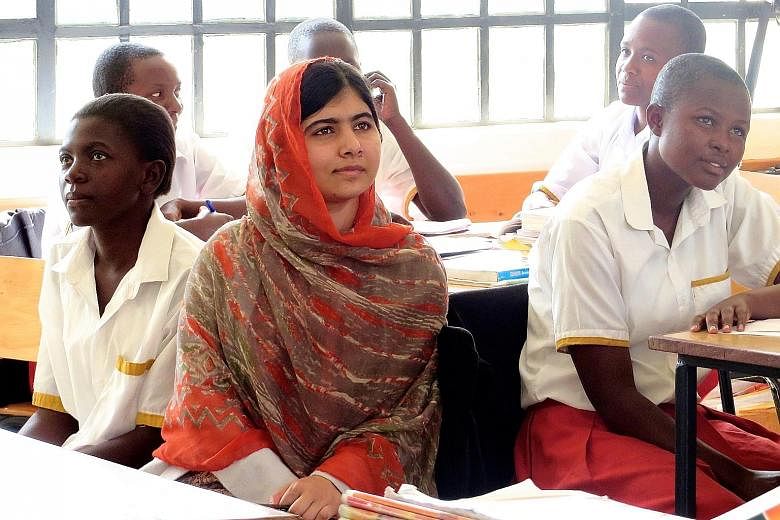It seems that Malala Yousafzai, who was shot by the Taleban in 2012 and went on to receive the Nobel Peace Prize two years later, was destined for an activist's life. The 18-year-old is named after the rebel fighter Malalai of Maiwand, dubbed the "Afghan Joan of Arc".
Her father Ziauddin Yousafzai says in English at a press conference: "I named my daughter after this girl because she was one of the few Pashtun women who are well-known. It is a folk-hero story from 1880, when the Pashtun were fleeing from the British in the battle of Maiwand.
"It is a well-known story in Pakistan and Afghanistan. Malalai raised her voice, motivated the Pashtun fighters and got herself killed."
His daughter almost suffered the same fate.
When the Taleban seized control of his homeland, the Swat Valley in northern Pakistan, girls were banned from schools.
Mr Yousafzai encouraged his daughter to write a blog for the BBC, highlighting the injustice. The Taleban responded by attempting to murder her in October 2012.
She survived the shooting and was flown to Britain for emergency treatment. She now studies in her new hometown of Birmingham, while also campaigning for deprived young girls and their right to a full education.
Her story is now told in the film He Named Me Malala (2015), directed by acclaimed documentarian Davis Guggenheim, who made the influential global warming film An Inconvenient Truth (2006). He Named Me Malala was nominated for an Oscar this year and airs on National Geographic Channel in Singapore this week. The Oscar went to Amy, the film about the late singer Amy Winehouse who died at age 27 in 2011.
Does the modern-day Malala think that her name decided her destiny?
Her answer is more matter of fact than romantic or grandiose.
"I started my campaign when I was only about 10 years old and it was due to the circumstances I faced," she says in fluent English at this press event that took place amid much secrecy.
"If there were no terrorists in Swat Valley and I could go to school, then I wouldn't have had to speak out because there would have been no need.
"I stood up because there was a need. Someone needed to stand up, to bring change, to talk about education. With the shooting, I was targeted because I spoke out openly. Some people were hesitating about saying the word 'Taleban', but I did not hesitate. I said that if they're doing these things, then why not say they are doing these things?
"Even if the incident had not happened, I would have continued this campaign and my mission. I had no idea if the attack was the end of my journey or a new beginning. It turned out to be a new beginning.
"I had seen the worst moment in my life and I chose to continue because any fear I had of being killed was gone. I feel as though no one can stop me."
It helps that she has the world's media on her side now. In 2013, 2014 and last year, Time magazine featured her as one of its 100 Most Influential People in the World, and she has shared the stage with a clutch of world leaders.
In 2013, she was invited to the Oval Office to meet American president Barack Obama and his wife.
A year later, she was the corecipient of the Nobel Peace Prize, along with Indian children's rights activist Kailash Satyarthi, lauded for her struggle against the suppression of children and young people and for the right of all children to education. Aged 17 at the time, Malala is the youngest Nobel laureate.
The prize, she says, has given her "strength and more courage to continue the fight".
"More than 66 million girls cannot go to school and the Nobel Peace Prize gave me the opportunity to spread this message further across the world and ask world leaders to focus more on this problem. Whether I won the award or not, I would have continued to focus on this message. It is part of my life. It's my life's mission."
In 10 years, she hopes to finish her university education and work in Pakistan, helping children to go to school.
"I have a strong commitment to my country and I have promised myself that I will help Pakistan to become a better country, that the people will get peace and quality education.
"It is a shame to know that there are children who get no schooling and that there are people with no facilities. I believe my country deserves the opportunity to see progress and development."
The Malalai of Maiwand story features in Guggenheim's film in an animated sequence.
He says: "Early on in my discussions with the family, the Malalai of Maiwand story came up because that's how Ziauddin picked his daughter's name.
"I thought it was interesting that he picked the name of a girl who spoke out and was killed for speaking out. There's a profound connection there."
• He Named Me Malala airs on National Geographic Channel (StarHub TV Channel 411, Singtel TV Channel 201) today at 10.40am and tomorrow at 10pm.

